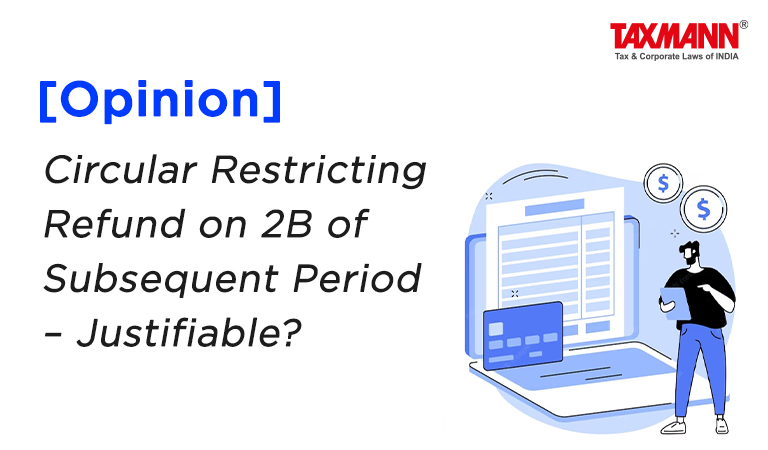[Opinion] Circular Restricting Refund on 2B of Subsequent Period – Justifiable?
- Blog|News|GST & Customs|
- 2 Min Read
- By Taxmann
- |
- Last Updated on 28 July, 2023

CA Shubham Khaitan & CA Sneha Khaitan – [2023] 152 taxmann.com 574 (Article)
The Government on 17th July 2023 issued circular no. 197/09/2023-GST clarifying certain refund-related issues. The first clause of the said circular was in relation to the disallowance of refund of input tax credit appearing other than in GSTR-2B of the current or past periods. So, if a tax invoice appears in GSTR-2B of a later month, the input tax credit shall not be allowed on the same. Let us review the clarification first before analyzing the same.
Clarification in brief
Where a taxpayer claims refund of accumulated ITC under Section 54(3) of the CGST Act, 2017 [i.e. zero rated supplies without payment/refund under inverted duty structure] it has been clarified that:-
i. On account of the insertion of Section 16(2)(aa) of the CGST Act, 2017 w.e.f January ’22, refund of ITC shall be restricted to those invoices whose details are getting reflected in GSTR-2B of the said refund period or any earlier periods.
ii. The said amendment shall be effective for refund claims for tax periods pertaining to January’22 and onwards.
iii. Where refunds pertaining to the tax period Jan’22 and onwards have already been sanctioned, before issuance of said circular, the said cases shall not be re-opened.
Section 16(2)(aa) of the CGST Act, 2017 which was made effective vide Notification No. 39/ 2021-CT dated 21/12/2021 entitles a taxpayer to avail credit only for those invoices/ debit notes which are getting reflected in the relevant or earlier tax period’s GSTR-2B. So, prima facie one may think that the circular issued is within the provisions of law.
However, the said circular denies refund altogether on invoices appearing in the later period’s GSTR-2B. In this article, we shall discuss as to how the clarification violates many settled principles of law and may lack adequate legal standing.
Click Here To Read The Full Article
Disclaimer: The content/information published on the website is only for general information of the user and shall not be construed as legal advice. While the Taxmann has exercised reasonable efforts to ensure the veracity of information/content published, Taxmann shall be under no liability in any manner whatsoever for incorrect information, if any.

Taxmann Publications has a dedicated in-house Research & Editorial Team. This team consists of a team of Chartered Accountants, Company Secretaries, and Lawyers. This team works under the guidance and supervision of editor-in-chief Mr Rakesh Bhargava.
The Research and Editorial Team is responsible for developing reliable and accurate content for the readers. The team follows the six-sigma approach to achieve the benchmark of zero error in its publications and research platforms. The team ensures that the following publication guidelines are thoroughly followed while developing the content:
- The statutory material is obtained only from the authorized and reliable sources
- All the latest developments in the judicial and legislative fields are covered
- Prepare the analytical write-ups on current, controversial, and important issues to help the readers to understand the concept and its implications
- Every content published by Taxmann is complete, accurate and lucid
- All evidence-based statements are supported with proper reference to Section, Circular No., Notification No. or citations
- The golden rules of grammar, style and consistency are thoroughly followed
- Font and size that’s easy to read and remain consistent across all imprint and digital publications are applied



 CA | CS | CMA
CA | CS | CMA
